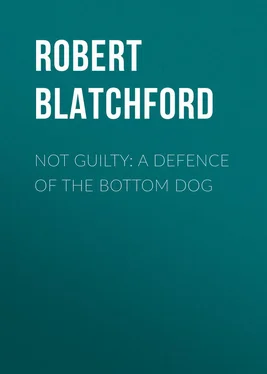Robert Blatchford - Not Guilty - A Defence of the Bottom Dog
Здесь есть возможность читать онлайн «Robert Blatchford - Not Guilty - A Defence of the Bottom Dog» — ознакомительный отрывок электронной книги совершенно бесплатно, а после прочтения отрывка купить полную версию. В некоторых случаях можно слушать аудио, скачать через торрент в формате fb2 и присутствует краткое содержание. Жанр: foreign_antique, foreign_prose, на английском языке. Описание произведения, (предисловие) а так же отзывы посетителей доступны на портале библиотеки ЛибКат.
- Название:Not Guilty: A Defence of the Bottom Dog
- Автор:
- Жанр:
- Год:неизвестен
- ISBN:нет данных
- Рейтинг книги:3 / 5. Голосов: 1
-
Избранное:Добавить в избранное
- Отзывы:
-
Ваша оценка:
- 60
- 1
- 2
- 3
- 4
- 5
Not Guilty: A Defence of the Bottom Dog: краткое содержание, описание и аннотация
Предлагаем к чтению аннотацию, описание, краткое содержание или предисловие (зависит от того, что написал сам автор книги «Not Guilty: A Defence of the Bottom Dog»). Если вы не нашли необходимую информацию о книге — напишите в комментариях, мы постараемся отыскать её.
Not Guilty: A Defence of the Bottom Dog — читать онлайн ознакомительный отрывок
Ниже представлен текст книги, разбитый по страницам. Система сохранения места последней прочитанной страницы, позволяет с удобством читать онлайн бесплатно книгу «Not Guilty: A Defence of the Bottom Dog», без необходимости каждый раз заново искать на чём Вы остановились. Поставьте закладку, и сможете в любой момент перейти на страницу, на которой закончили чтение.
Интервал:
Закладка:
We know that there is a great difference between the Irish and the Scotch. We know that there is a great difference between the Italians and the Dutch. We know the strongly marked peculiarities of the Jews and the Greeks.
Now, to blame a man for his nature is to blame him for not being like some other man. And how absurd it would be to blame a Norwegian for not being like a Jew, or a Gascon for not being like a Scot.
The Italians are wayward and impulsive: the Dutch are steadfast and cautious. Is it reasonable to blame the one for not being like the other?
If a child is born of an Italian father and an Irish mother, is it reasonable to expect that child to be as cool and methodical as the child of Dutch and Scottish parents?
Is it not the same with personal as with racial traits?
We have all heard of "Spanish pride," and of "Irish wit"; we have all heard of the pride of the Howards, and the genius of the Bachs.
To blame a Spaniard for being proud is to blame him for being born of Spanish parents. To blame a Howard for his pride is to blame him for being a son of the Howards.
Bach was a musical genius, Sheridan was witty, Nelson was brave, Rembrandt was a great painter, because there were golden beads in their ancestral bottles. But they did not put the golden beads there. They inherited them, as Lord Tomnoddy inherits his lands, his riches, and his plentiful lack of wit.
We should not expect the daughter of Carmen to be like the daughter of Jeannie Deans, nor the son of Rawdon Crawley to be like the son of Parson Adams. We should, indeed, no more think of praising a man for inheriting the genius or the virtues of his ancestors, than we should think of praising a man for inheriting his parents' wealth.
We have laughed over the Gilbertian satire on our patriotic boastfulness:
For he himself has said it,
And it's greatly to his credit,
That he is an Englishman.
He might have been a Rooshian,
A Frenchman, Turk, or Prooshian,
Or even Italian;
But in spite of all temptations
To belong to other nations,
He remains an Englishman.
All of us can feel the point of those satirical lines; but some of us have yet to learn that a man can no more help being born "good" or "bad," "smart" or "dull," than he can help being born English, French, or Prooshian, or "even Italian."
Some of our ancestors conquered at Hastings, and some of them did not Some of our ancestors held the pass at Thermopylae, and others ran away at Bunker's Hill. Some were saints, and some were petty larcenists; some were philosophers, and some were pirates; some were knights and some were savages; some were gentle ladies, some were apes, and some were hogs. And we inherit from them all.
We are all of us great-great-grandchildren of the beasts. We carry the bestial attributes in our blood: some more, some less. Who amongst us is so pure and exalted that he has never been conscious of the bestial taint? Who amongst us has not fought with wild beasts – not at Ephesus, but in his own heart?
Some of our ancestors wore tails! Is it strange that some of our descendants should have what Winwood Reade called "tailed minds"? The ghosts of old tragedies haunt the gloomy vestibules of many human minds. The Bottom Dog may often be possessed of ancestral devils.
He that is without inherited taint among us, let him cast the first stone.
CHAPTER FOUR – THE BEGINNINGS OF MORALS
Sin is disobedience of the laws of God.
Crime is disobedience of the laws of men.
Vice is disobedience of the laws of nature.
I say that there is no such thing as a known law of God: that the so-called laws of God were made by men in God's name, and that therefore the word "sin" need trouble us no more. There is no such thing as sin.
I say that since there are bad laws as well as good laws, a crime may be a good instead of a bad act. For though it is wrong to disobey a good law, it may be right to disobey a bad law.
And now what do we mean by the words "good" and "bad," "moral" and "immoral"?
We call an act good when it "makes good"; when its effects are beneficial. We call an act bad when it "makes bad"; when its effects are injurious.
What are "morals"? My dictionary says, "the doctrine of man's moral duties and social relations "; and in Crabbe's Synonyms I find: "By an observance of good morals we become good members of society ."
The italics are mine. Morals are the standard of social conduct. All immoral conduct is anti-social, and all anti-social conduct is immoral.
If there were only one man in the world he could not act immorally, for there would be no other person whom his acts could injure or offend.
Where two persons live together either may act immorally, for he may so act as to injure or offend his companion.
Any act is immoral and wrong which needlessly injures a fellow creature. But no act is immoral or wrong which does not directly or indirectly inflict needless injury upon any fellow creature.
I say, "needless injury"; for it may sometimes be right and necessary to injure a fellow creature.
If it is wrong to inflict needless injury upon our fellows, it is right to defend our fellows and ourselves from the attacks of those who would needlessly injure us.
Any act which inflicts "needless" injury upon a fellow creature is immoral; but no act which does not inflict needless injury upon a fellow creature is immoral.
That is the root of my moral code. It may at first seem insufficient, but I think it will be found to reach high enough, wide enough, and deep enough to cover all true morality. For there is hardly any act a man can perform which does not affect a fellow creature.
For instance, if a man takes to drink, or neglects his health, he injures others as well as himself. For he becomes a less agreeable and a less useful member of society. He takes more from the common stock, and gives back less. He may even become an eyesore, or a danger, or a burden to his fellows. A cricketer who drank, or neglected to practise, would be acting as immorally towards the rest of the team as he would if he fielded carelessly or batted selfishly. Because, speaking morally, a man belongs not only to himself, but also to the whole human race.
Morals do not come by revelation, but by evolution. Morals are not based upon the commands of God, but upon the nature and the needs of man. Our churches attribute the origin of morals to the Bible. But the Egyptians and Babylons had moral codes before Moses was born or the Bible written. Thousands of years, tens of thousands of years, perhaps millions of years before Abraham, there were civilisations and moral codes.
Even before the coming of man there were the beginnings of morals in the animal world.
When I was a boy, we were taught that acts were right or wrong as they were pleasing or displeasing to the God of the Hebrew Bible.
There were two kinds of men – good men and bad men. The good men might expect to succeed in business here and go to heaven hereafter. The bad men were in peril of financial frosts in this world, and of penal fires in the world to come.
As I grew older and began to think for myself, I broke from that teaching, and at last came to see that all acts were wrong which caused needless injury to others; that the best and happiest man was he who most earnestly devoted himself to making others happy; that all wrong-doing sprang from selfishness, and all welldoing from unselfishness; that all moral acts were social acts, and all immoral acts unsocial acts; and that therefore Socialism was good, and Individualism was evil.
Читать дальшеИнтервал:
Закладка:
Похожие книги на «Not Guilty: A Defence of the Bottom Dog»
Представляем Вашему вниманию похожие книги на «Not Guilty: A Defence of the Bottom Dog» списком для выбора. Мы отобрали схожую по названию и смыслу литературу в надежде предоставить читателям больше вариантов отыскать новые, интересные, ещё непрочитанные произведения.
Обсуждение, отзывы о книге «Not Guilty: A Defence of the Bottom Dog» и просто собственные мнения читателей. Оставьте ваши комментарии, напишите, что Вы думаете о произведении, его смысле или главных героях. Укажите что конкретно понравилось, а что нет, и почему Вы так считаете.












